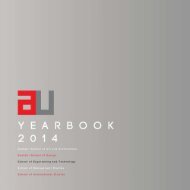EOY2013
Create successful ePaper yourself
Turn your PDF publications into a flip-book with our unique Google optimized e-Paper software.
SIS 131<br />
How Stories<br />
Can Save Us<br />
Professor John Ruff, Valparaiso University<br />
The America fiction writer Tim O’Brien, in the last story of his brilliant collection of interconnected stories about a platoon<br />
of American foot soldiers fighting in the Vietnam War, The Things They Carried, claims “stories can save us.” Not our<br />
bodies, O’Brien contends, but our souls. And I think he’s right in a number of ways. Here’s such a story. Once upon<br />
a time a young man named Henry David Thoreau built himself a cottage at the edge of a pond, on land a mile or so out<br />
of Concord, Massachusetts that belonged to his mentor, Ralph Waldo Emerson. With a borrowed axe, with lumber<br />
salvaged from an Irish railroad worker’s shanty, with the volunteer labor of famous friends, including Emerson and Bronson<br />
Alcott, Thoreau fashioned for himself a place to read and think. While the rest of country put its shoulder to the massive<br />
undertaking of development and Western expansion, digging canals, putting in railroads, building factories and forges,<br />
Thoreau read, thought, took walks, filled his notebooks with news about the weather and the wildlife, grew beans and<br />
baked his bread. The most famous fruit of his labor there was Walden, a book to which we can trace the origins of<br />
environmental thinking in America--it is where ecocriticism begins, and where we find one of the shrewdest critiques of<br />
American capitalism and consumer culture yet written.<br />
In his journals, we learn that nothing he reads moves Thoreau more than certain ancient Indian classics he probably<br />
borrowed from Emerson’s library, The Upanishads, The Vedas, The Law of Manu, The Dharma Shastras, and most of all,<br />
The Bhagavad Gita. To students of American literature and culture, it can come as a something of a revelation, for some<br />
it might border on heresy, to read that one of the prime architects of American individualism, American as apple pie in his<br />
anti-authoritarianism and freedom of mind and expression, an American original if there ever was one, was in certain ways<br />
an intellectual knockoff made in India. But it is a true, and there is evidence to support that claim all through out Walden.<br />
And why does that matter? Well, consider how it might affect the way we read the writer of Essay on Civil Disobedience,<br />
which Thoreau wrote to explain his decision not to pay a poll tax that would support a government that would launch<br />
an unjust war against Mexico and countenance slavery and protect the legal rights of slave holders. In whatever<br />
history of non-violent resistance you read, that essay is a landmark even as Sophocles’ Antigone and Plato’s Apology<br />
are landmarks. Scholars debate where and when exactly Mohandas Gandhi read Thoreau’s Essay, whether it was at<br />
Oxford in 1900 or in South Africa in 1908, when he and others went to jail rather than pay a tax imposed unfairly on<br />
people of color there. One scholar I consulted says Gandhi read (or reread) Thoreau’s account of his night in jail while<br />
Gandhi himself was in jail. One wonders if Dr. King, in jail in Birmingham, Alabama, about to write his famous Letter<br />
from Birmingham Jail in the margins of a newspaper, though of these famous precedents. Now there can be no doubt<br />
Thoreau’s essay contributed to the formation of Gandhi’s practice of satyagraha, which Dr. Martin Luther King himself<br />
would embrace and implement as a young leader of a bus boycott in Montgomery, Alabama. King claims in “Pilgrimage<br />
to Non-Violence,” a chapter from his book, The Montgomery Story, that it was Gandhi who taught him how to read<br />
Jesus’s Sermon on the Mount as bodying forth a philosophy of nonviolence and love that could be applied by oppressed<br />
peoples fighting for freedom and justice. Prior to reading Gandhi, King claims he took the gospel message of turning the<br />
other cheek and forgiving one’s enemy as applying to individuals, not entire groups. That is a huge debt to acknowledge,<br />
as a Christian preacher descended from generations of Christian preachers, for being instructed on the true meaning of<br />
his own religious tradition by a Hindu leader, though I seem to recall Gandhi also acknowledging Thoreau on having a<br />
similar impact on his relation to the Gita.<br />
That Thoreau influenced Gandhi, King, and Nelson Mandela is beyond doubt, and the impact of that influence in human<br />
history is inestimable. Behind that long story stands, imperturbed, Arjuna’s story in the Bhadavad Gita. So what is the<br />
point of all this? American philosopher Martha Nussbaum, in a recent book entitled Not For Profit: Why Democracy<br />
Needs the Humanities, makes the argument that education without the humanities will leave us ill-prepared to create a<br />
habitable future that is just and wisely governed; that the study of history, philosophy, and literature create such<br />
intellectual virtues as curiosity, integrity, and self-scrutiny, habits of the mind and also habits of the heart, especially<br />
empathy, without which a sense of community beyond the family cannot exist. For Nussbaum, Democracy cannot<br />
exist without an educated electorate, and being educated for life means more than being trained for an occupation, and<br />
neglecting to acknowledge that endangers our development and the full flourishing of humanity and a just distribution of<br />
the world’s bounty.<br />
John Ruff has been in the teaching profession for 30 plus years. He has taught in the English department at Valparaiso University since<br />
1989. He specializes in teaching first year students, literary modernism, poetry, children’s literature, and American literature. Besides<br />
teaching in the English department, Professor Ruff is director of Valpo’s CORE programme for freshmen- He helped develop and since<br />
1998 has directed and taught in their first year core class, a year-long interdisciplinary humanities course that all first year students in their<br />
general education programme take there. He says “putting together CORE was the most exciting thing I’ve done in my academic career.”<br />
This inter-disciplinary first year core programme is the cornerstone of their general education programme and constitutes about a third of<br />
the credits required for graduation for most students, no matter what their major.<br />
John Ruff was an Assistant Dean for five years, so he has worked a lot in academic advising. He also served on a University Task Force on<br />
Writing at Valpo that helped to design a campus wide writing programme modeled after some of the best programmes in the United States.<br />
He is also on the Wordfest Committee, Faculty Senate, the Curriculum Committee for the College of Arts and Sciences, the General Education<br />
Oversight Committee, and the Collection Committee for the Brauer Museum of Art.<br />
John Ruff began his teaching career teaching elementary in Rome, Italy, in 1975; He has also taught at the middle school and high school<br />
level. Please visit his personal homepage at the Valpo website http://www.valpo.edu/english/faculty/ruff.php to know more about him. Prof.<br />
Ruff has had three different opportunities to teach in China. He arrived at Ansal University on March 2, 2013 on his maiden visit to India.<br />
YEARBOOK 2013





